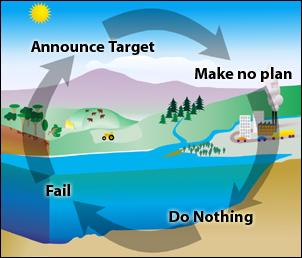So, the report of the inquiry into the Christchurch massacre has finally been released, and (of course) exonerated the spies and the police from any blame for their failures. Meanwhile, it is recommending the creation of a new, specialist counter-terrorism agency. So as usual, the spies will be given even more money and power, despite a massive display of incompetence which saw 51 people killed. That'll teach them to do their jobs properly!
The report has an entire section devoted to how our spy agencies look for terrorists. I've spent the afternoon reading it, and it is a dismal litany of incompetence and mismanagement. We have a whole bunch of "national security" agencies - SIS, GCSB, NAB, Police - but no-one is really in charge. Despite multiple bodies designed to do the job - an oversight board, a Cabinet officials committee, a unit within DPMC - there's no co-ordination, and little awareness of who is doing what. No-one sets priorities for them. No-one knows who is responsible for what. No-one even checks up to ensure they do what they're supposed to: SSC, Treasury, and the Auditor-General (who monitor everyone else) say "secret spy-stuff, not my problem", while the statutory Intelligence and Security Committee is a captured joke. Its quite telling that they didn't even know who was in charge of counter-terrorism. They're all little classified silos, doing their own thing, resistant to oversight and sharing information only on a limited "need-to-know" basis, with no standards, no performance-monitoring, and no accountability. And we shovel hundreds of millions of dollars a year at them. With this sort of structure, its no wonder that all we get is failure.
And of course, they were all resolutely looking the other way, focusing on the "threat" of Islamist terrorism, because that's what their foreign partners were looking at. Oh, the inquiry found a handful of reports - out of literally hundreds - which mentioned the possibility of white supremacist domestic terrorism in passing, but they were ignored. As was a more specific 2011 report from CTAG on Availability of Firearms in New Zealand to Terrorists, Violent Extremists and Acutely Disaffected Persons, which highlighted the huge problems with our gun laws and the vetting regime. As the report notes, "this assessment was not well received by some public sector agencies" (because it was seen as intruding on their patch), and when the government asked the Police if they needed law changes in this area, they said no as gun crime wasn't a problem (Meanwhile, they were sticking a small arsenal in every police car because gun crime was a problem). The SIS only started wanting to look at white supremacy in 2018, when their foreign "allies" started to - a classic example of our cargo cult intelligence mindset. And of course they'd barely begun the job when the massacre happened.
So wouldn't a new agency fix all that? Not really. All it will do is create another silo, staffed by the same people, with the same institutional culture, getting its priorities from the same foreign "allies", and making exactly the same mistakes. The police get their fair share of blame in the above, but I can't help but feel that treating this as a law-enforcement problem, rather than a spy one, would result in better outcomes for everyone.






